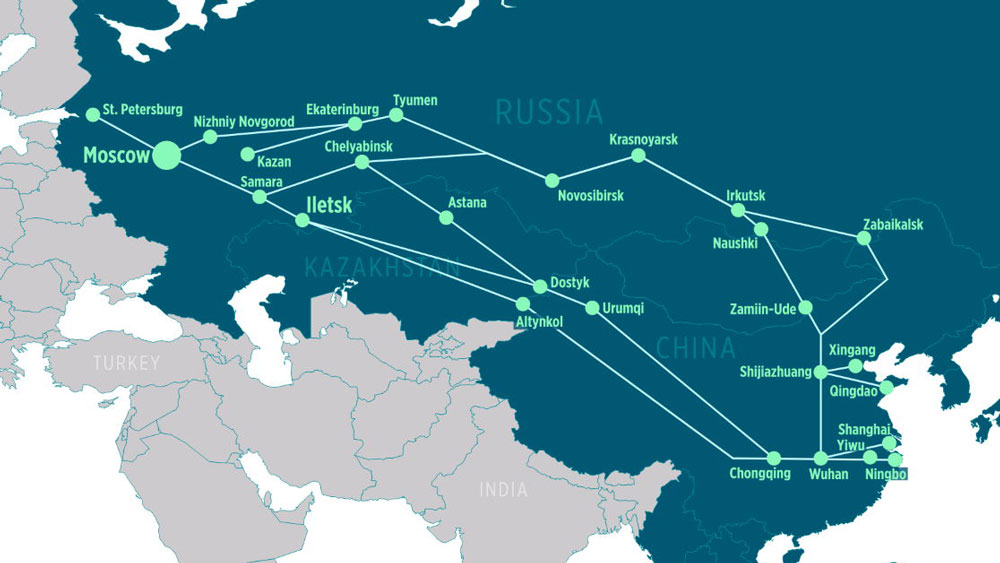NewSmartShip Logistics specializes in rail freight from China to Russia. Our services encompass major Chinese railway stations and cargo delivery to Russian cities, including Moscow, Rostov-on-Don, and Krasnodar. We also offer railway delivery options to other cities. We will transport your cargo securely in 20 or 40GP equivalent containers, ensuring safe and efficient delivery.
China-Russia Rail Unloading Station in Russia
Rail freight from China to Russia includes various destinations across the country. The main delivery stations are Moscow, Rostov-on-Don, and Krasnodar. If the consignee’s warehouse is in a different city, we offer container transportation by road to the final destination after customs clearance.
Specifically for train shipping from China to Moscow, cargo trains arrive at stations such as Vorsino, Beliy Rast, Electrougly, Selyatino, and Khovrino. At these stations, we provide unloading, terminal handling, customs clearance, and container documentation services. We also ensure the delivery of cargo to the consignee’s warehouse. Our services include cargo delivery from China to Moscow by railway, serving direct trains from Vladivostok.
In addition to Moscow, we offer railway cargo transportation to other cities across Russia.
The features of railway cargo transportation to Rostov-on-Don
In the south, Rostov-on-Don is the main point of destination for cargoes transported from China by railway. There is infrastructure for receiving and handling a vast freight traffic volume, and it is developing increasingly.
Nowadays, there are two stations in Rostov-on-Don: Rostov-Zapadniy and Rostov-Tovarniy. Freight terminal Forte-Trans operates at the station Rostov-Zapadniy. It mainly handles cargo delivered by the Fesco line. Freight terminal Transcontainer operates at the station Rostov-Tovarniy, where other lines handle and provide their containers and cargoes. Customs examinations, cargo repacking, and pick-up operations can be performed at both terminals.
Rail freight from China to Krasnodar
We are excited to introduce a new railway route from China to Russia for container cargo delivery to Krasnodar. Our dedicated forwarding department has taken proactive measures to organize and streamline the cargo receiving and handling procedures in Krasnodar.
Once the rail arrives, cargo is transported to the Transport terminal at the Krasnodar-Sortirovochnaya station. At this terminal, various types of cargo, including dry, phytosanitary, and veterinary goods, are handled with care. The terminal provides facilities for cargo repacking and conducts all necessary customs examination procedures.
Once the cargo has completed customs clearance and is released, it is efficiently picked up and delivered to the consignee’s warehouse using container trucks.
The advantageous location of the terminal within the city boundaries dramatically simplifies the delivery process via trucks after customs clearance. This strategic placement of transportation hubs offers significant benefits to all consignees in the Krasnodar region.
How much is rail transportation from China to Russia?
The cost of cargo delivery comprises two main components: sea transportation to Vladivostok and subsequent railway transportation across the Russian Federation from Vladivostok to other cities.
Please note that rates are subject to daily fluctuations, and we consistently update our proposals for clients before booking placement.
As of Jan 2024, the price range for transporting a 40-foot container by sea and railway from China to Moscow is approximately $6,150 to $6,800. The total amount may vary depending on the distance from the Chinese port.
What does the China-Russia Rail freight rate include?
The rate includes the following:
- Rail Transportation: The rail freight rate will include the cost of transporting.
- Transit cargo cost (on the client’s request): If the client requires transit services for their goods, the rate will include the execution of transit.
However, the rate does not include the following services, which are separately charged:
- Security services: If the client requires additional security measures for their cargo, such as specialized security personnel or equipment, the cost of these security services is not included in the rate and will be billed separately.
- Cargo insurance: The rate does not include cargo insurance. If the client wishes to insure their goods against potential loss or damage during transportation, they must arrange cargo insurance separately and cover the associated costs.
The Transit time for rail shipping from China to Russia
The China-Russia Railway Express maintains an average speed of 900 km daily. The estimated transit time from the originating station in China to the destination station in Russia is typically between 16 and 20 days. However, it’s important to note that this timeframe does not account for the days spent on cargo processing at the border or waiting for loading. Considering these factors, the delivery time can range from 22 to 45 days. The specific duration depends on seasonal fluctuations in demand and the capacity of transshipment stations.
It is worth mentioning that the cargo car may stay in the station stock for 2 to 7 days before transferring to the terminal, but handling at the terminal usually takes just 24 hours.
Advantages of China-Russia Rail Freight
Cargo transportation by railway offers numerous advantages:
- Independence from weather conditions: Unlike other modes of transportation, railway transport is not significantly affected by weather conditions. Trains can operate reliably regardless of rain, snow, or other adverse weather conditions, ensuring consistent delivery schedules.
- Regular service: Railway freight operates on regular schedules, providing predictable and consistent transportation options for cargo. This helps in planning and managing supply chains effectively.
- Stable tariffs: Railway tariffs typically remain stable throughout the year and are not subject to seasonal fluctuations. This provides cost predictability and better budgeting and financial planning for cargo transportation.
Conclusion
Currently, the development of cargo transportation by railway is progressing rapidly. Previously, local freight terminals primarily served as personal baggage and long-distance travel transportation companies. However, they are now being retrofitted and rebuilt to handle growing container freight volumes efficiently. This adaptation ensures that railway freight terminals can effectively handle increasing demand and traffic for containerized cargo transportation.


